Study English with Us – Practice English Speaking
You will have 30 minutes to practice speaking English every day. We hope this lesson helps you to have more confidence in your English ability. If you do not have anybody to practice English conversations with, look for English language apps that have a recording tool. Use the recorder to report yourself talking English after which hearken to it. Do you sound just like the English speaker you’re repeating?Study English with Us – Exercise 1: University’s Calendar
Good morning everyone, welcome to the international language center for the 2000-2001 academic year. We hope this year will be a year of success for you. Now let me give you a quick rundown of our calendar for the first quarter.
The orientation for new students will be held next Thursday, August 31st. September 4th will be our holiday, that is Labor Day, so there will be no school on that day. The first day of class will be on Tuesday, September 5th. About one month later, there will come another holiday, Thanksgiving day. That’s October 9th. There is no school on that Monday. November 9th will be our last day of class. That’s Thursday the following day will be exam day. Please remember that’s November 10th and be prepared for the examination.
I’d like to tell you that regular attendance at this school is necessary for all classes and lectures. We expect at least 90 percent attendance is taken by each subject teacher. You know, you cannot succeed in school if attendance is irregular. Absences of 20% or more will result in students being placed on probation for one quarter. Continued absences may result in the student being required to withdraw from the school.
It’s our expectation you will all grow to realize your full potential and contribute your talents to this year’s activities.
Study English with Us – Exercise 2: About The Coursework
Hello, everyone. Before you start your course, we would like to tell you a little about the background of how the course is designed. You will have an opportunity to discuss the emphasis you would like the course to have in the first two units. We are confident you will benefit from the course if you can agree on what is important to do and how you would like it to be done.
The emphasis of this course is on observing how native speakers use English, describing how the language is used, discussing difficulties, and practicing the language as it is really used.
Much of the material particularly in the second part of each unit, may seem simple; from a structural and vocabulary point of view, that is. The emphasis, however, is not on knowing nor even understanding, such language, but on being able to use it yourself.
This course is not for those who want to know something about English, but for those who wish to use it effectively as a means of spoken communication.
The following assumptions are made throughout the course:
- It is possible to study the spoken language, and this is in no way inferior to the written language.
- Some students find grammar rules helpful others do not but nobody finds rules helpful which are full of exceptions.
- It helps to learn more words, but it often helps more to learn to use those you already know more effectively.
- At your level, discussing the language and how it is used is an essential element in learning.
- It helps to use authentic materials.
This course is not for those who want to know but for those who want to use the language. The most important objective of the course is to help you to be yourself in English.
Study English with Us – Exercise 3: Being Involved in Campus Life
Good morning and welcome to our regular lecture on being a confident student. This series of lectures is organized by the Students Union. And we want to help you to cope well with life on campus. Today it’s a great pleasure for me to welcome Ms. Diana Sheeran who is the president of the Students Union and she has been kind enough to give up her time to come along and talk to us.
Thank you very much, John. May I say it’s a pleasure to be here? Now, I know, being away from home and having to look after yourself can make you feel homesick and give you a hard time, so today I’m going to talk about the ways of making sure that you get involved in campus life. This may help you cope better with your study and life on campus.
To become more involved in campus life, use your college’s resources, which include places to go for help, people who can help you, and publications that can help you. Your instructors, academic advisors, counselors, department heads, resident advisors, coaches, and club sponsors are among the people you can ask for help.
Become familiar with the services your college provides and know where to get them. The Registrar’s Office answers all questions about records and grades. The Career Center can help assess your interests and skills. The Guidance Office offers help with course selection and scheduling and may offer personal counseling as well. Learning Labs and Libraries provide equipment and learning resources to help you improve your skills and meet course requirements. The Financial Aid Office handles questions about fee payment scholarships, loans, grants, and jobs available on campus. If you need more instruction than you are getting in the classroom, your college may provide a tutor.
Learn English with Us – Exercise 4: The first year undergraduates two students are talking in the students canteen
A: Is this seat taken.
B: No.
A: May I sit here.
B: Please do. Are you a new student?
A: Yes. I’m Marty from Korea I got here only yesterday. B: I’m Alan second year in law nice to meet you.
A: Nice to meet you too. Alan, could you tell me something about the first-year student’s life here? B: Okay. You know the first-year student’s life can be exciting but terrifying for the first week.
A: Why is it terrifying?
B: Oh. Many first-year students will feel very homesick for the first week since this is their first time away from home.
A: By the way, do you live on campus. B: Yes. I live in a hall of residence.
A: That’s good living in a hall of residence soon helps you to make some new friends. You know the university always provides accommodation to the first-year students they may move out into a rented room in their second or third year or share a house with friends.
B: I see. That’s reasonable for the first-year students so they don’t worry about their accommodation and transportation problems.
A: That’s right. During the first week, all the clubs and societies will hold a student’s fair during which they try to persuade new students to join their society.
B: Oh. I heard about that I expected this kind of fair. I’d like to join some sports clubs so I will have something to do in my spare time. The first-year students are told that it is important for them to come into contact with many opinions and activities during their time at university. The first week you may be taken to visit the campus. You can see groups of students walking around the huge campus finding their way around in the first week of university. And at weekends, the university may organize some trips to places nearby so you will be quite busy for the first few weeks.
A: It sounds good all the activities will keep me busy. Thank you, Alan. You are welcome and hope you will enjoy your stay here.
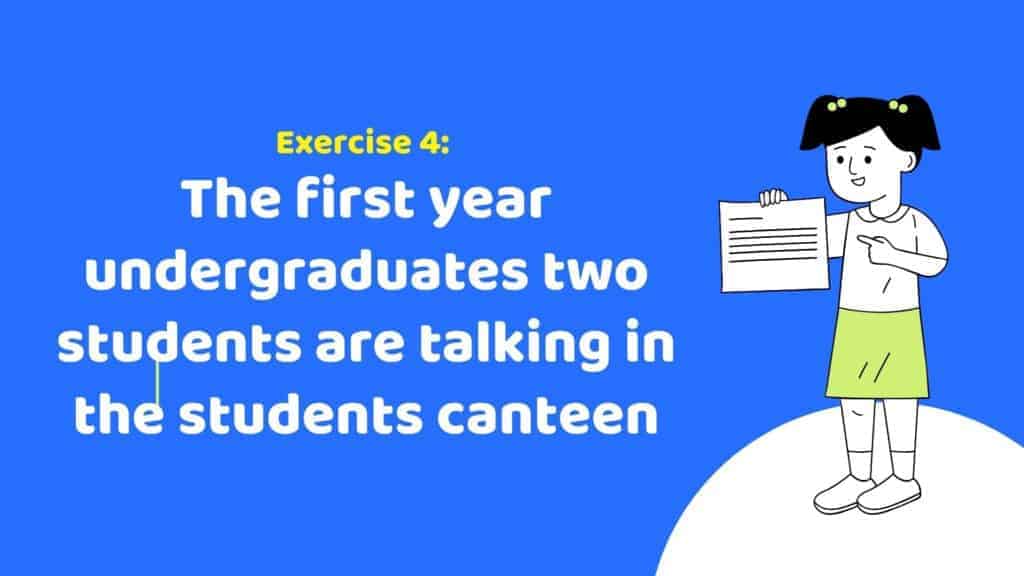
Study English with Us – Exercise 5: Be a Successful Student
Today I’d like to talk about how to be a successful student. First, you should discover who you are and what you want to be. We all have our own personalities, qualities, character, and relationships. All those things together make us who we are. It’s time to ask yourself “What kind of a person do you want to be?”
Shakespeare said the world is a stage and we all play different roles. Well, what roles do you play as a student or a teacher, musician, or doctor? Write your roles down. For each role, what are your responsibilities?
Then ask yourself, what would you want to do and what would your future look like? How do people get what they want? How can you make your dreams come true? One thing to do is to set a goal and make a plan to achieve your goals.
We all know that good thing don’t happen overnight, but you have to be prepared: you might just have to work hard to make it happen. Remember…
You need to make a plan for your goals. Write down your short-term goals and break them into weekly goals so you know exactly what you need to do each week. You will be surprised by how helpful this can be. Some projects are small and can be completed in a day. But then, there are big projects like essays, reports, personal goals,… difficult things that require planning, time, and effort. So you can plan personal and academic goals on the monthly and weekly planning pages of your list. Make it easy on yourself.
Break down your projects or goals into small, easier steps and work towards them one step at a time.
When you finish your plan you should start to do it. Once you get going, it’s much easier to continue. You can reward yourself with a treat for example some healthy snack or game, for making progress on a project. You can work with a friend and encourage each other. You can design your own study schedule and stick to it. But, be in control don’t interrupt your study time for phone calls or TV shows.
When you finish studying, you should review and check all completed tasks, mark unfinished tasks with a future date and get ready to do it the next day.
Now, let’s just refresh our memories. First, to discover who you are and what you want to be. Then, plan to achieve your goals. And last is to do it because you can.
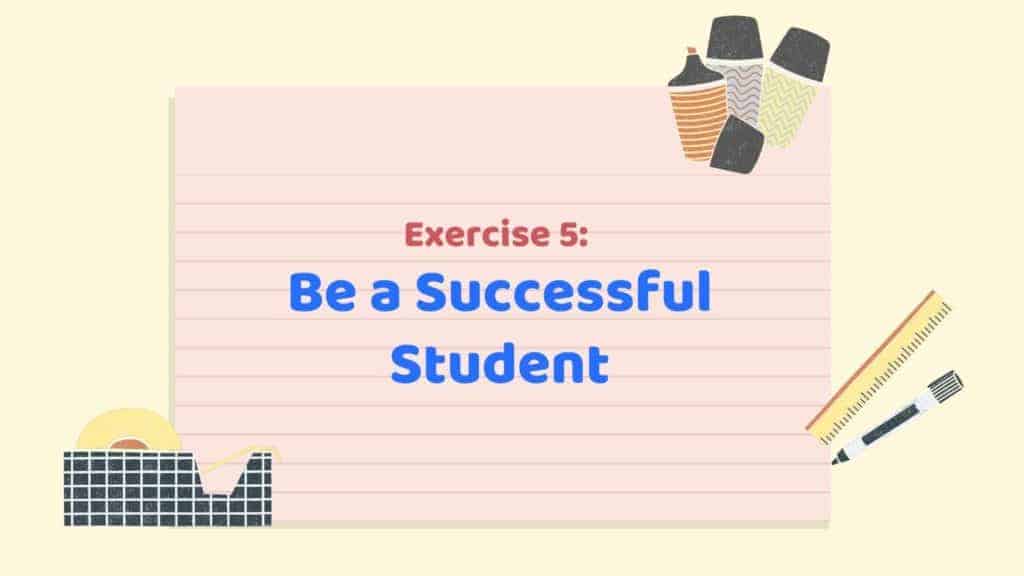
Study English with Us – Exercise 6: Homestay Programme
A: Excuse me. Could you tell me what the Homestay Programme in the brochure is?
B: The Homestay Programme is designed to promote friendship and language learning. We try to provide the opportunity for cultural exchange between Canadians and international students who attend the university. Local people open their homes to students so that they may experience an exchange of friendship across cultures many friendships that last a lifetime have developed from these stays.
A: I see. What kind of families do you choose for the hosts?
B: All kinds of families participate in this Homestay Programme. There are single people with or without children, as well as couples with or without children.
A: Are they Canadians?
B: Yes, of course. They are Canadians of many races and cultures, for example, they may be originally from Asian countries, so do not expect that your hosts will be Caucasian. But all hosts will speak English fluently, but some may have accents.
A: Do the hosts know this program well?
B: Yes. The homestay coordinator has visited each family and provides information on the programme and explains the responsibilities of the host. They look for people who are kind and friendly and enjoy
meeting students from other countries. They make sure the hosts understand that this program is not designed for their financial gain.
A: It sounds good.
B: If you are interested, you can apply for this programme. Here is some more information to help you understand the programme.
A: What is it?
B: You must be willing to communicate with the hosts to establish a good relationship with them. This communication will require honesty, patience, and effort because cultural and language differences sometimes create misunderstandings and confusion. You must be willing to interact with the hosts.
A: That’s what I expect to do.
B: Good. The hosts will be concerned about you and will want to do all they can to help you achieve success. They will encourage you to discuss your thoughts and feelings openly with the host family. If a problem arises that you cannot resolve in this way, the homestay coordinator is always available to help you.
A: Thank you very much. I think I’d like to apply for the Homestay Programme.
B: That’s good. You can go to the Homestay Office to fill in some forms. I hope your experience will be a positive one.
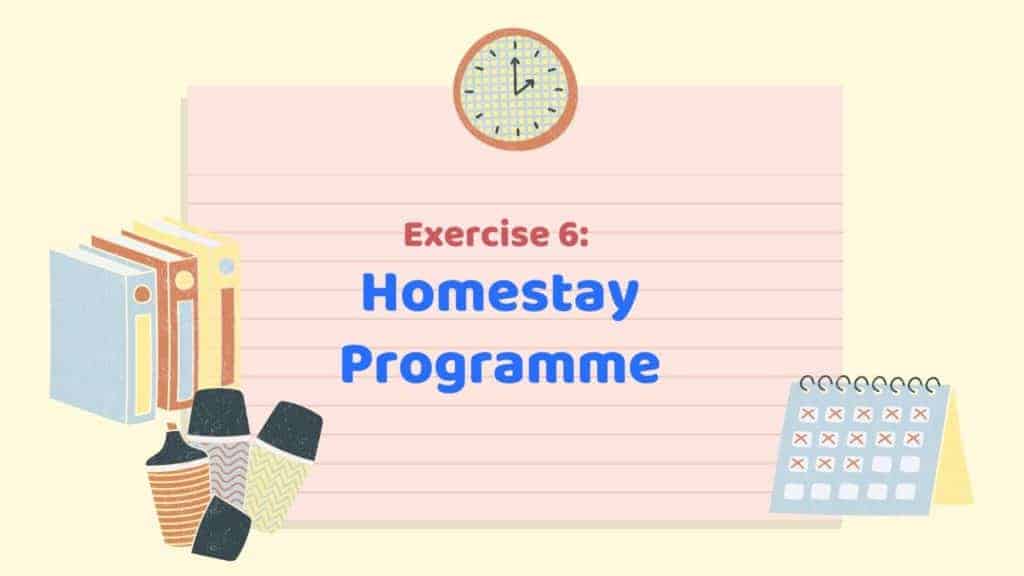
Study English with Us – Exercise 7 : Koala
Good morning everyone. In today’s lecture, I want to look at one of Australia’s famous and most loved animals-the Koala. The Koala is the Australian teddy bear and is the largest member of the phalanger family.
The Koala looks like a teddy bear. It is two and a half feet long, with ears seeming as if they were stuck on, beady eyes, and no tail. Its dense, woolly fur is blue-gray in color and was used commercially for fur until koalas were almost exterminated. They are pouched mammals, of course, not bears at all, but closely related to the challengers.
Koalas spend most of all their lives in the eucalyptus trees, feeding on their leaves. Their toes are armed with sharp claws, and their fingers are divided into two groups, the split in the hand coming between the index and middle finger, instead of between thumb and fingers as in our hand. The great toe is thumb-like. All of these features aid in climbing. Koalas, although usually slow and deliberate in movement, are able to spring from one upright branch to another with surprising skill.
Their babies are carried in the pouch at first, then it clings to the fur of the mother’s back, riding piggyback until it is almost as large as the mother. Koalas have become quite tame and they are great attractions at the various Australian zoos and parks.
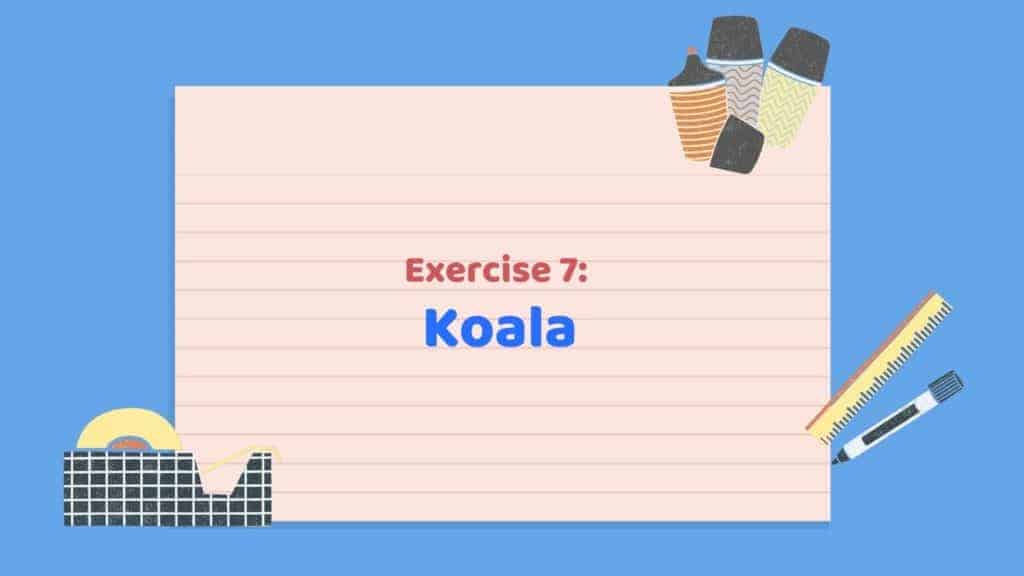
Learn English with Us – Exercise 8: Stamp Collecting
The collecting of postage stamps is a hobby that interests people of all ages and all walks of life. It has countless followers in every land. There are over 2 million stamp collectors in the United States and Canada, and among these are a great many boys and girls.
The most valuable stamp in the world is the one-cent British Guiana magenta of 1856. Only one copy is known to exist; it is valued at about fifty thousand dollars. There are other stamps worth several thousand dollars while many others are valued at hundreds of dollars. Yet most stamps are not expensive. There are hundreds of stamps worth a few dollars and many more hundreds that you may buy for a few cents. So you see that stamp collecting is not merely a rich man’s hobby.
Each stamp-collector finds his own stamps fascinating, no matter how much or how little money he spends on them. The reason is that there is always a story behind postage stamps.
The countries of the world use them as a means of telling the world about their industries, their culture, their great men. They also use stamps to celebrate important events in their history. So while a stamp collector is enjoying his hobby, he is also storing up knowledge about all kinds of things from every corner of the globe.
Usually, a beginner collects everything that comes his way. This is the best method, as in this way he will become acquainted with a wide variety of steps. Later on, he may decide to specialize in certain kinds.
But unless he has already collected all sorts of postage stamps, he will not have enough general information about his hobby to enjoy it to the full.
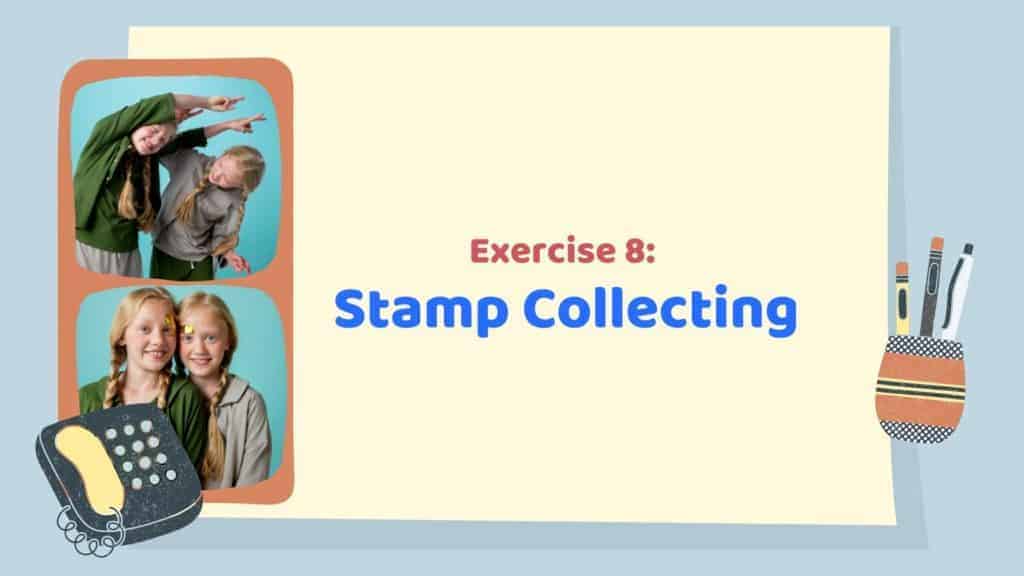
You may also like: Listening Practice Through Dictation FULL – English Speaking
Study English with Us – Exercise 9: Get the Right Food to Stay Slim
Good morning, everyone, and welcome to our regular program on health issues. Today I’m going to talk about ways of staying healthy and slim. You know, some people seem to eat to stay alive while for others eating is a hobby. Do you enjoy your food? Are you careful about what you eat, or do you eat what you enjoy?
Here is a very simple way to choose the foods that will keep you slim and in shape and feeling great. And you don’t have to count calories. Let’s divide the main types of foods into three groups according to their calorie concentration.
First, we will use red for food that is high in calories. Secondly, we’ll use yellow for food that is medium in calories. Then, we will use the green color for the food that is low in calories. Now, let’s look at the red group. You will find sugar, chocolate, cakes, puddings, honey, jam, cream, butter, chips, peanuts, and soft drinks. Because these foods are high in calories, you should stop and think before you eat them. In fact, you should try to avoid them as much as possible. Moving on to the yellow group, you will find fatty meats, sausages, liver, eggs, milk, cheese, nuts, wine, beer, and salt. When you eat these kinds of food you should be careful and not eat too much of them. Then, we come to the last group, the green one.
This group includes fresh fruit, salads, vegetables, seafood, yogurt, skimmed, milk, bread, low-calorie soft drinks, tea, and water. When you eat these foods, you can go ahead and eat lots of them.
You should use these three groups to discover a sensible balance that suits you. Remember, it is easier to stay slim than to lose weight once you have put it on. A little care choosing what you eat and enough regular exercise will go a long way to get you feeling great.

Study English with Us – Exercise 10: Our Body Systems
Our body is a wonderful machine. It has more parts and can do more types of work than any machine in the world. That is why we say that man is the supreme living thing in this world.
Well, now let’s have a look at our body systems. I’m going to go through them quickly and then we will have a look at them in detail.
Our bodies are made up of several parts: the head, neck, trunk, arms, and legs. These parts are held together by a framework called the skeleton. The skeleton is made up of bones and it gives the body its shape and form. Bones not only support our bodies but also help to protect important organs. The skull protects the brain. The ribs protect the lungs and heart. The hips protect part of the food canal. The spine protects the spinal cord. There are different types of bones in our bodies. The main support of the body is the backbone or spine. It is made up of a long row of small bones joined to one another it is found only in the neck and trunk.
The bones of our body are hard white and strong. When a bone breaks, new cells begin to grow at the broken ends. More and more new cells are formed until finally the broken ends meet and join together.
To find out if a bone is broken, the doctor uses an X-ray machine. This machine can photograph the inside of the body. The photographs it takes are called X-ray photographs. The ribs can be seen clearly from it.
There are more than 600 muscles in your body. They make up the flesh that lies between the skin and the skeleton. Muscles can contract and relax. Their contraction and relaxation cause body movements. They also push food through the body and make the blood circulate.
Now let’s see the nervous system. It is made up of three parts the brain, the spinal cord, and the nerves. All parts of the body are connected to the brain by nerves. Nerves act like telegraph wires. They carry messages from the different parts of the body to the brain. Then the brain decides on what to do and it sends messages back to the appropriate parts of the body. This system controls all muscle movement and also controls your senses. So the nervous system is very important because without it we will not be able to feel, smell, taste, hear and see. The brain is the most important part of the nervous system. It controls the movements of the body and sends out instructions to all parts of the body.
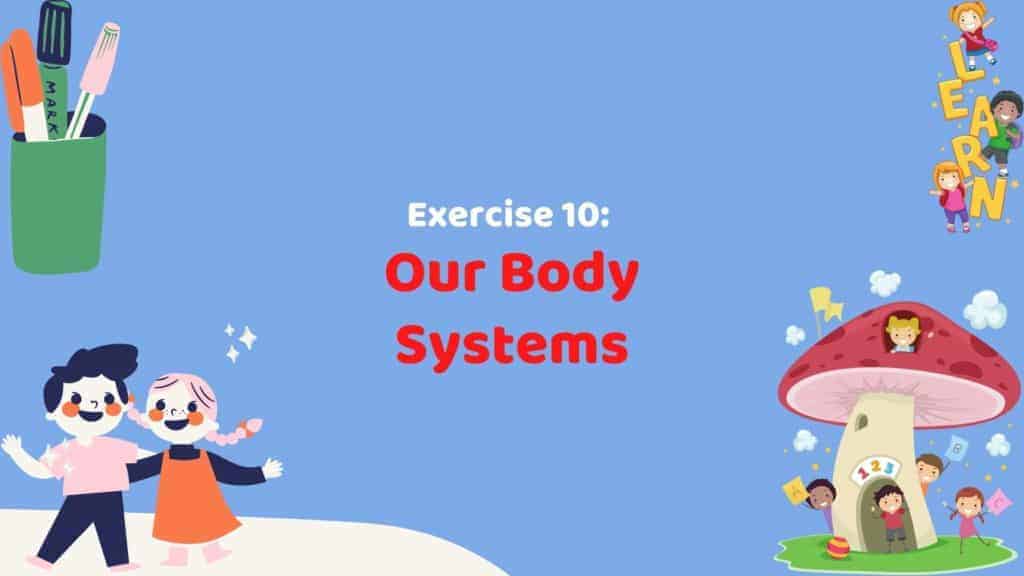
Learn English with Us – Exercise 11: Inventor of the Telephone
Today people can talk to each other even if they are thousands of miles apart. They can hear each other as clearly as if they were in the same room. The man who made this possible was Alexander Graham Bell. His invention is the telephone. The telephone sends the human voice from one end of the world to the other.
Bell is famous not only as an investor. He is also well known as a writer of books to help people who cannot speak or hear. He was a teacher of such people. This made him interested in sound. This interest led to his invention.
Alexander Bell was born in Edinburgh, Scotland in 1847. As a boy, he was interested in inventions. He went to the University of Edinburgh and London. His father and grandfather had both been teachers of deaf people. His father had worked out a system of “Visible Speech”, that is, a system by which a deaf person can “see” what people say by reading their lips. Bell learned this system. He soon became a teacher of the deaf and he opened his own school for deaf people in Canada.
Through his teaching, Bell became interested in the sound of the human voice. He thought that it should be possible to send sound across a distance. That is what the word telephone means-far sound. With his assistant, Thomas A. Watson, he worked day and night on this idea. They strung wires across several rooms. Each time when they thought that they had found a way, they tried to talk through the wires.
Each time they were disappointed. After each failure, they made some changes and tried again.
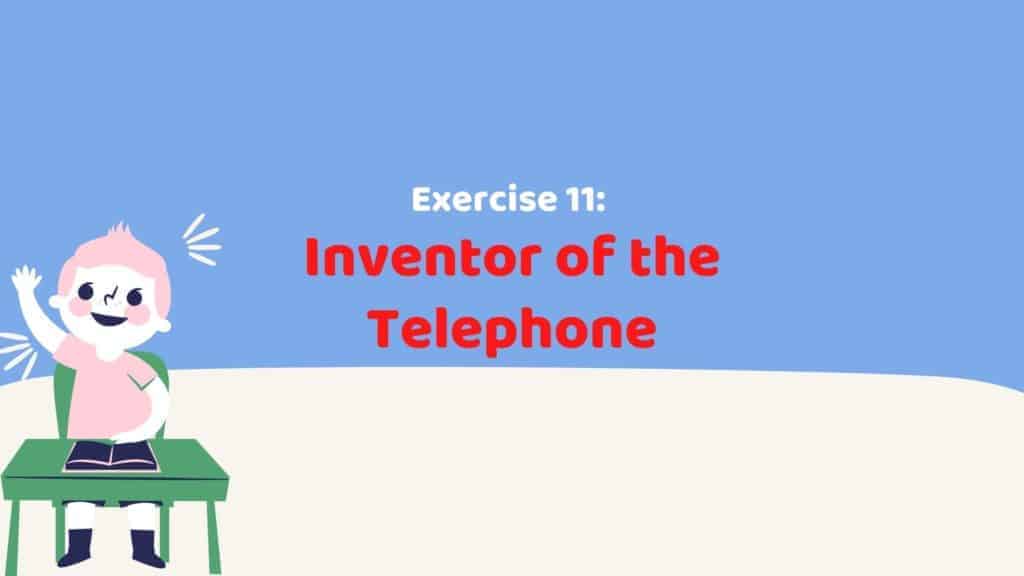
Study English with Us – Exercise 12: Inventor of the Telephone
Then one day in June of 1875 Watson, who was downstairs, heard Bell’s voice from the attic: “Mr.Watson, please come here, I want you.” Watson was so excited that he ran upstairs crying “I heard you. Mr. Bell. I heard you clearly”. On that day the telephone had been invented. The words Bell spoke to Watson were the first telephone message ever sent.
Bell and Watson continued to work to improve the telephone. The first long-distance, a two-way telephone conversation took place later that same year. It was between Boston and Cambridge, Massachusetts, a distance of two miles.
In 1877, a telephone company was formed. The first telephone exchange was opened the next year in New Haven. Connecticut. It had eight lines and 21 telephones. From that time on, telephone systems grew fast. Two years later, there were over 47,000 telephones in the United States. The telephone spread rapidly both here and in Europe. Bell lived to see millions of telephones used all over the world. He had the joy of speaking from coast to coast by telephone. He died shortly before telephone service across the ocean was established. His invention brought him wealth and great honors. He was given many medals and honorary degrees. His invention has often been called one of America’s greatest gifts to the world.
When Alexander Graham Bell died on August 2nd, 1922, all the telephones in the united states were silent for one minute in memory of a great man.
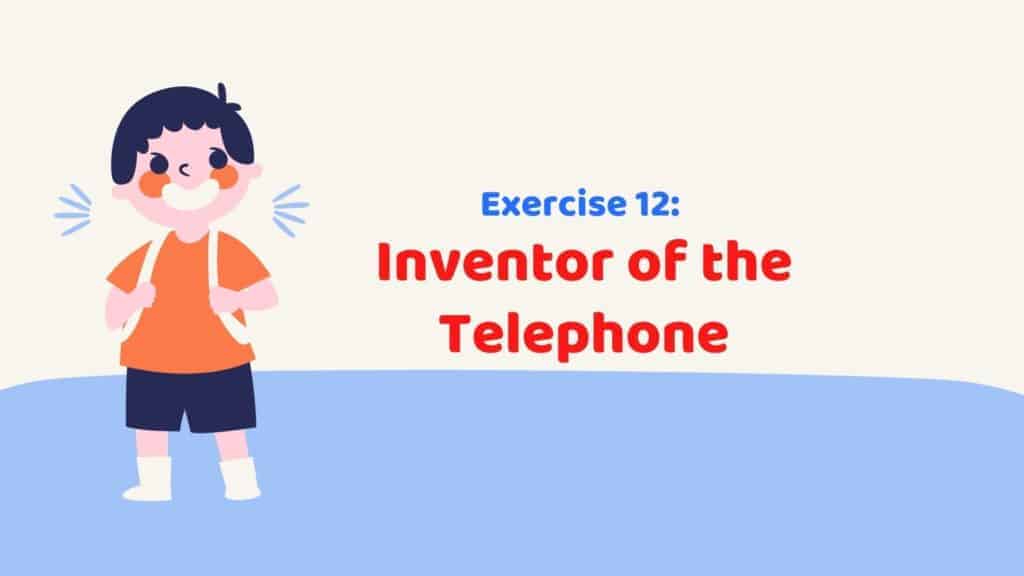
Conclusion
Above is a summary of Study English with Us – Lesson 1. Hopefully, we have contributed to help you learn English in general, become more accessible and more interesting. Good luck with your study and soon!
Subscribe to the English tivi channel on Youtube to improve your English learning skills!
Source: https://englishtivi.com/study-english-with-us-lesson-1/

ConversionConversion EmoticonEmoticon